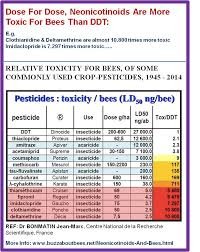Yikes! Three-Fourths of World’s Honey Contains a Harmful Pesticide

A new report has found that 75 percent of the world’s honey contains pesticides called neonicotinoids or neonics. The authors concluded that these agents, which are purported to protect crops from vermin, have a harmful effect on the insects that pollinate one-third of our food supply. It’s time to stop the mass-scale use of the chemicals.
In the study published in the journal Science, Edward Mitchell, a biology professor at the University of Neuchatel in Switzerland, led a research team in collecting honey samples from six continents between 2012 and 2016. Of the 198 samples they tested for the five primary types of neonics, at least one type was found in 86 percent from North America, 80 percent from Asia, 79 percent from Europe, 73 percent from Africa, 71 percent from Australia and 57 percent from South America. Almost half of the samples contained more than one neonic, and 10 percent contained four or five.

How Do Neonics Affect Bees?
The authors expressed serious concern about the impact of neonics on bees. “Although the impact of the measured concentrations of neonicotinoids in honey on vertebrates, including humans, is considered negligible, a significant detrimental effect on bees is likely for a substantial proportion of the analyzed samples, as adult bees rely on honey for food, including during periods of overwintering or seasons without blossoming flowers,” they said.
“The increasingly documented sublethal effects of neonicotinoid pesticides at environmentally relevant concentrations on bees and other nontarget organisms include growth disorders, reduced efficiency of the immune system, neurological and cognitive disorders, respiratory and reproductive function, queen survival, foraging efficiency, and homing capacity at concentrations as low as 0.10 ng/g,” they added.

How Do Neonics Affect Humans?
Researchers in the study didn’t seem worried about the possibility of adverse health effects on humans resulting from the consumption of neonic-laced honey. However, not everyone is convinced that long-term consumption of small amounts of the chemical is safe. People can ingest neonics from the crops sprayed with the pesticide as well as honey. According to Dave Goulson, Professor of Biology at the University of Sussex, the chronic effects aren’t known, reports Daily Mail.
“Beyond doubt…anyone regularly eating honey is likely to be getting a small dose of mixed neurotoxins,” he said. “In terms of acute toxicity, this certainly won’t kill them and is unlikely to do measurable harm. What we don’t know is whether there are long-term, chronic effects from life-time exposure to a cocktail of these and other pesticides in our honey and most other foods.”

Risks of Neonics Outweigh Benefits
Do we really need neonics? EcoWatch reports that the latest research shows the class of pesticides provide little or no benefit for crop production. Neonics reduce soil quality, harm the environment and don’t dependably lower the risk of farmers’ financial risk, the publication contends.
Since the risks outweigh the benefits, especially for the critically needed bee population, neonics should be banned. In 2013, the E.U. imposed a temporary ban on three neonics on bee-attractive crops, and the agency is considering extending the moratorium. In addition, Canada’s Pesticide Management Regulatory Agency has proposed phasing out one neonic in 2021. Conversely, North American oversight agencies haven’t recognized the environmental threat posed by the chemicals and the necessity of preventing further harm. It’s best to buy organic fruits, vegetables, grains and honey to minimize exposure to pesticides.
By Mary West
http://www.liveinthenow.com/article/75-worlds-honey-contains-harmful-pesticides
Interesting. I didn't know this :(